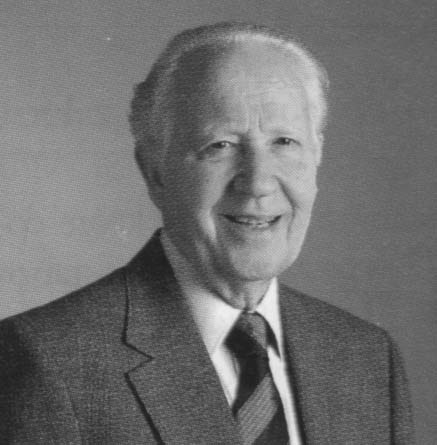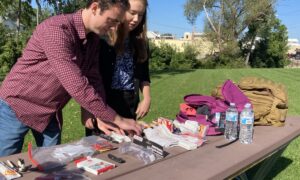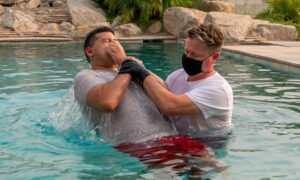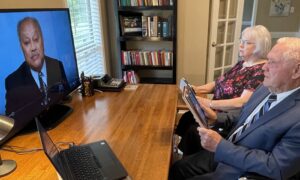Brother Barr has completed his earthly course on Saturday, December 4, 2010
I WAS on the last leg of a visit home a year ago last June, flying from Glasgow to Aberdeen. As our plane climbed steeply over the green Scottish countryside and on over the lazily flowing river Clyde, my thoughts raced back to the year 1906 and that little village of Bishopton, nestled somewhere down there to the south of the river.

You see, that was the year and place when my grandmother, Emily Jewell, started to read Charles T. Russell’s book The Divine Plan of the Ages. Immediately her eyes were opened to the truth that the Bible does not teach the doctrine of hellfire. Soon her two grown daughters Bessie and Emily (the latter became my mother) also began to see the light of truth shining through the mists of false doctrine taught by the United Free Church of Scotland. In 1908 Granny was baptized in symbol of her dedication to do God’s will, and her daughters were baptized shortly afterward.
My father was the session clerk in the same United Free Church in Bishopton. He had always found it difficult to accept the doctrine of the Trinity, so the church minister offered to preach a special sermon for his benefit one Sunday. That did it! On hearing the attempted explanation, my father was now convinced that the Trinity doctrine was false. He resigned from the church and was baptized in 1912 in symbol of his dedication to Jehovah. Shortly afterward my parents moved north to Aberdeen with their two children, Louie and James, and I was born there in 1913.
My thoughts about those early years and about my parents’ efforts to bring us three children up “in the discipline and mental-regulating of Jehovah” stayed with me as the plane began its descent over the hills, rivers, and valleys that I had known from childhood. (Ephesians 6:4) On this beautiful sunny morning, how grateful I felt to Jehovah for that parental training! I knew that it had contributed toward my always remaining close to Jehovah’s organization.
Value of Early Training
Our family was always a happily united one. If ever Father and Mother had some difference of viewpoint, they tried never to show this in front of us children. This created for us not only respect for our parents but also an environment of real peace and security within our home.
Some of my fondest memories center around our family get-togethers in the evenings. We supplied our own entertainment, doing such things as singing to our own musical accompaniment and playing together board games such as Monopoly. Also, no matter how busy Father was, he never failed to spend some time with us practically every day, reading aloud from the Bible and the Watch Tower publications, as well as from other literature both of a light and of a more serious kind. All these things served to keep our family close together as we grew up.
We were the only “truth” family in that northern part of Scotland in those early years. As a result, our home became well known to many of the Watch Tower Society’s traveling representatives (pilgrims, as they were then called), such as Albert Lloyd, Herbert Senior, and Fred Scott. Some even came from the Society’s headquarters in Brooklyn, New York, including W. E. Van Amburgh and A. H. Macmillan. These visits were milestones in my early years.
To this day I feel thankful for the genuine spirit of hospitality shown by my parents. This enriched our family life, and although young I began to widen out in my appreciation for the whole association of brothers. Oh, how much parents can do toward cultivating a warm bond of love between their children and the worldwide association of their brothers!
Coping With a Personal Problem
As I entered my early teens, I became an increasingly shy and retiring boy. The older I grew, the more difficult I found it to meet people and make conversation with them. This shyness presented a big obstacle in many ways but especially so when it came to proving my faith by preaching the good news of the Kingdom.
Shortly after World War I, my grandmother and my mother became the first Witnesses in Aberdeen to take part in the house-to-house ministry. We children shared in distributing tracts, but now for me actually to talk to people at their homes—why, that was something different! That was a real challenge. But I finally met it. I shall never forget that Sunday afternoon in November 1927 when I told my father that I was going to accompany him in the door-to-door ministry. It was the first time ever that I saw tears on my father’s cheeks—tears of joy in this case!
Family Tragedy Affected Me
The peaceful tranquillity of our family life was shattered on the evening of June 25, 1929, when I was 16. After a day in the ministry, my mother and my sister were hurrying home to prepare Father’s supper. Suddenly, a speeding motorcycle hit Mother, dragging her along the street for about 40 yards (37 m). Her head injuries were so severe that she was not expected to live. But thanks to many months of loving care by my sister Louie, she survived. In time, Mother was able to lead a comparatively normal life until her death in 1952.
That traumatic experience did something very important for me—it made me take a serious look at my life and what I was doing with it. That summer I started to study the Bible far more deeply than previously—I made the truth my own. This was the big turning point for me, and I dedicated my life to Jehovah’s service. However, it was not until some years later that I had the opportunity of symbolizing my dedication by water baptism.
Entering the Full-Time Service
On leaving school in 1932, I embarked on a course of training in mechanical and electrical engineering. In Britain in those days, there was not the encouragement that there is today for young ones to enter the full-time preaching work as pioneers. Yet, as the years went on, I knew where I ought to be expending my energies—in the full-time ministry.
I vividly recall something we studied early in 1938 that emphasized to me the benefits of staying close to Jehovah’s organization and personally applying its instructions. It was the Watchtower magazine issues regarding Jonah that explained the experiences he went through in running away from his assignment of service. I took this lesson very much to heart, making up my mind that I must never turn down any assignment that came to me through Jehovah’s organization. Little did I realize then how many theocratic assignments lay ahead to test my resolve.
I prayed for guidance, and the answer came by means of a surprise letter from the Society’s headquarters in London, asking me to consider becoming a member of the Bethel family. I eagerly grasped the opportunity to go through that large door leading to greater privileges of service. Thus, in April 1939 I found myself working alongside Harold King, who later served as a missionary in China and, because of his preaching activity, spent years in a communist prison. We worked on assembling transcription machines and also phonographs used for playing recorded sermons at the doors of people’s homes.
Harold and I would imagine all the different kinds of people who eventually would listen to the Kingdom message by means of the equipment we were making. In this way we never lost sight of the end result of our work. Since then, in all the different assignments I have received at Bethel, I have endeavored to keep this outlook. This has made my work a real joy and always meaningful in relation to the Kingdom-preaching work.
Privileges of Service
Shortly after arriving at London Bethel, I was appointed as company servant (now called presiding overseer) of a congregation with well over 200 publishers. Previously, I had been the overseer of a congregation of only ten publishers! Then I was put in charge of the Sound Department for a marvelous countrywide convention held in Leicester in 1941. Up to this time, I had had only limited experience in sound.
Later I was assigned to the traveling work as a servant to the brethren, now called circuit overseer. There were only six such servants in Britain when that work was started in January 1943. My assignment was to be only for a month, but it ended up with my visiting the congregations for more than three years. During those same difficult World War II years, I had the oversight of three large conventions—something I had never done previously.
The traveling work in those days was quite different from what it is today. We were always on the move, and travel throughout Britain during those war years was sometimes very difficult. On more than one occasion, I had to resort to a bicycle for part of the journey between congregations. Instead of visiting one congregation a week, as traveling overseers do today, if congregations were small, we would visit as many as six of them in one week!
Here was a typical day’s schedule: Up at five-thirty; after breakfast, travel to the next congregation so as to start checking the congregation’s records by eight o’clock. The afternoon was usually spent in the field ministry, this being followed in the evening by a one-hour meeting with the servants of the congregation and then a talk to the congregation. I was seldom in bed before 11, or even later if I wrote up the day’s report on the congregation that same evening. Every Monday was set aside for completing the reports for the week, for personal study, and for any preparatory work for the following week.
‘A very busy week’s schedule,’ you say? Yes, it was, but, oh, how rewarding to feel that we were strengthening the brothers during those war years when there was not always the same close contact with the organization! In a very literal sense, we had the satisfaction of feeling that we were helping the congregations “to be made firm in the faith.”—Acts 16:5.
Back to Bethel Service
I was asked to return to Bethel service in April 1946. I was happy to do so, but I felt that my life had been enriched spiritually as a result of those three and a half years in the traveling work. The organization meant more to me now, and I felt as if I had been doing what is described at Psalm 48:12, 13: “March around Zion, you people, and go about it, count its towers. . . . Inspect its dwelling towers.” Having moved about more among God’s people had caused my love to grow for “the whole association of brothers.”—1 Peter 2:17.
Following my return to Bethel, I was privileged to care for much of the printing done at our London printery and later was involved in the plate-making work as well. Then, in September 1977 I had the unique privilege extended to me of becoming a member of the Governing Body of Jehovah’s Witnesses, located in Brooklyn, New York, U.S.A.
I must admit that at times I felt like ‘running away’ from some of the more difficult assignments given to me. But then I would recall Jonah and the mistake he made, and I would repeat to myself that wonderful promise found at Psalm 55:22: “Throw your burden upon Jehovah himself, and he himself will sustain you. Never will he allow the righteous one to totter.” How true I have found these words to be!
Jehovah never asks any one of us to do something that he knows we cannot handle. However, it is only in his strength that we are able to do what he asks. And another thing—if you truly love your brothers working alongside you, they will support you and back you up, working with you “shoulder to shoulder” in order to help you carry your assigned work load.—Zephaniah 3:9.
Precious Relationships
Of course, there are always some Christian brothers for whom you feel a special attachment. One of these was Alfred Pryce Hughes, who died in 1978. His life story appeared in the April 1, 1963, issue of The Watchtower. For many years he served as the branch servant, and later as a member of the Branch Committee. He was greatly loved by the brothers in the British field because of his great respect for Jehovah’s organization and his loyalty to it and his love for all the brothers. Another thing was his love for the field ministry. This never diminished throughout his life, no matter what responsibility he had to shoulder. Working alongside faithful brothers like Pryce has meant so much to me, strengthening my determination to stay close to Jehovah’s organization and remain active in the ministry.
On October 29, 1960, I entered an especially precious relationship with a longtime zealous pioneer and missionary of the 11th class of Gilead, who was at the time serving in Ireland. On that date Mildred Willett and I were married, and ever since she has been a faithful support to me in Bethel service.
Before Mildred’s mother died in 1965, she advised her daughter never to be “jealous of Jehovah.” Mildred has always remembered her mother’s words, and this has helped prevent her from becoming discontented when I have often had to work overtime. This has greatly helped me to care happily for any added work assignments that have come my way. We have both especially enjoyed sharing many rewarding experiences in the ministry.
One young couple we studied the Bible with, for example, made rapid progress to the point of dedication and baptism and regularly shared in the ministry. We were so delighted! Then, suddenly, for no apparent reason, they stopped associating. Mildred and I shared the disappointment, and we kept wondering where we had gone wrong in our training of them. We constantly prayed to Jehovah that he would still open their hearts to prove their love for the truth. Can you imagine our happiness when we received a letter from this couple about ten years later telling us that they were again actively associated and that their home was now a Book Study center?
Husband Will wrote: “I wish to thank you for all the help and loving consideration you provided for us . . . My falling away was my fault, my heart appreciation was not right . . . We have found great joy being back in Jehovah’s organization . . . It is with fond memories that I am writing you tonight, may Jehovah continue to bless you both in your service to him.”
In another letter, a mother wrote us regarding her boy Mike: “I am so glad the angels sat him next to you.” What did she mean? Well, Mike had come along to a convention with his mother and younger brother, but he was not really interested in the truth. Mildred noticed the lad sitting by himself and chatted with him. Then we both invited him and his brother to come to London Bethel and see the work we did.
Later, Mike came, and what he saw sparked his interest sufficiently to continue having a Bible study. The result? He’s now an elder in the congregation, and his wife and two boys are all active in the ministry. Some time ago Mike’s wife wrote: “[Mike] has often mentioned meeting you both . . . How impressed he was by your kindness and interest in him.”
When my wife and I receive expressions of appreciation from someone like Will or Mike that we have been privileged to help, our hearts simply overflow in gratefulness to Jehovah! What priceless rewards such living “letters of recommendation” are—all part of the joy received from staying close to Jehovah’s organization.—2 Corinthians 3:1-3.
Serving at World Headquarters
“A nation unto itself.” That is how the editor of a Brooklyn Heights newspaper described the big family of more than 3,500 Witnesses living at the world headquarters of Jehovah’s Witnesses in Brooklyn, New York, and at Watchtower Farms, located about a hundred miles (160 km) away in upstate New York. Truly, Jehovah’s anointed ones are a spiritual nation in Jehovah’s eyes! Today, multitudes from many worldly nations are coming forward and saying to those of this nation: “We will go with you people, for we have heard that God is with you people.”—Zechariah 8:23; 1 Peter 2:9.
Can you appreciate, then, how thrilling it was for my wife and me to become a permanent part of this big Bethel family? I would say without any hesitation that the last eight years of my life have been by far the most outstanding in all my theocratic experience. Here you feel the pulse of Jehovah’s visible organization; here the spiritual food is prepared and then sent out to the four corners of the earth; here you see Jehovah’s spirit at work guiding and directing momentous decisions that have to be made; and here you sense more than anywhere else the cumulative evidence of Jehovah’s blessing upon the work of Kingdom preaching and disciple making. All these recent experiences and impressions have given me added incentive to stay ever closer to Jehovah’s people.
I have recounted only a very few of my life’s experiences. However, they may help you to understand why, as my plane finally touched down at Aberdeen Airport that sunny June morning, I felt so grateful to Jehovah that I was still a part of our loving worldwide association of brothers. I had spent the flight time reminiscing about my years in the truth, and this reminded me yet again how beneficial it is for us from time to time to recount our many blessings at Jehovah’s hand.—Psalm 40:5.
My sister Louie was there to greet me—still faithful, zealous, and loyal after more than 60 years of dedicated service to Jehovah. I thanked Jehovah for that added blessing, for did not the apostle Paul say that it is faithfulness that Jehovah looks for in all of his “stewards”? (1 Corinthians 4:2) What great encouragement one member of a family can give to another by remaining faithful!
Moses once prayed: “Show us just how to count our days in such a way that we may bring a heart of wisdom in.” (Psalm 90:12) As Mildred and I grow older, we appreciate the need always to lean on Jehovah’s wisdom so as to use our life in a way that demonstrates our love for him and our brothers. Jehovah lovingly shows us that way if we stay close to his organization.





